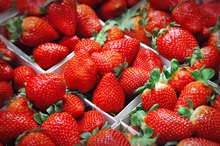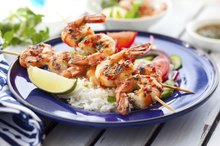What does fact checked mean?
At Healthfully, we strive to deliver objective content that is accurate and up-to-date. Our team periodically reviews articles in order to ensure content quality. The sources cited below consist of evidence from peer-reviewed journals, prominent medical organizations, academic associations, and government data.
- Family Doctor: Gout
- Mayo Clinic: Gout Diet
- American Dietetic Association: Celebrate Blueberries -- An American Fruit
The information contained on this site is for informational purposes only, and should not be used as a substitute for the advice of a professional health care provider. Please check with the appropriate physician regarding health questions and concerns. Although we strive to deliver accurate and up-to-date information, no guarantee to that effect is made.
About Blueberries and Gout
Gout is a form of arthritis that can cause sudden and severe attacks of pain, swelling and stiffness. Gout can be an intermittent or constant problem if not treated properly, and attacks can range from mild to severe. While diet alone does not cause gout, eating the wrong foods can contribute to the development of this disease. If you have been diagnosed with gout, your physician can recommend what foods, such as blueberries, should be included or excluded from your diet.
If you are experiencing serious medical symptoms, seek emergency treatment immediately.
Gout
Your body naturally makes uric acid, and it is also a byproduct created when you digest foods containing purines. If too much uric acid accumulates in the body, your kidneys may have trouble filtering it, which can lead to the development of crystals. These crystals can settle in your joints and cause gout. Gout attacks can come on suddenly; while any area of the body can be affected, it most commonly occurs in the big toe. Depending on the severity of your attacks, you may be able to manage your symptoms with diet or you may need medication to decrease the amount of uric acid in the body as well as to reduce pain and swelling, according to the Family Doctor website.
- Your body naturally makes uric acid, and it is also a byproduct created when you digest foods containing purines.
- If too much uric acid accumulates in the body, your kidneys may have trouble filtering it, which can lead to the development of crystals.
Foods to Avoid
Are Radishes Good for Gout?
Learn More
An important part of managing gout is to drink plenty of water and limit intake of foods that are high in purines.
A general goal is to limit your intake of animal sources of protein to 4 to 6 ounces a day, suggests the Mayo Clinic 1. You also need to watch your intake of alcohol, because alcohol hinders your body's ability to excrete uric acid. Other foods that are high in purines include anchovies, asparagus, dried beans, peas and mushrooms. Limiting intake of high purine foods may not cure you of gout, but in some cases it can limit the frequency and severity of attacks.
- An important part of managing gout is to drink plenty of water and limit intake of foods that are high in purines.
- A general goal is to limit your intake of animal sources of protein to 4 to 6 ounces a day, suggests the Mayo Clinic 1.
Foods to Include
The same healthy eating guidelines that apply to losing weight and managing heart disease, diabetes and cancer can be followed by those living with gout. Aim to get plenty of healthy carbohydrates, such as whole grain foods, because carbohydrates help your body get rid of excess uric acid. One serving of blueberries is 1/2 cup canned or one cup fresh. If you choose juice or canned or frozen blueberries, go for products that are low in calories and sugar.
- The same healthy eating guidelines that apply to losing weight and managing heart disease, diabetes and cancer can be followed by those living with gout.
Benefits of Eating Blueberries
Strawberries for Gout
Learn More
While including blueberries in your diet alone will not cure your gout, they are part of an overall healthy diet. Blueberries are high in antioxidants and fiber, and one cup’s worth will provide you with a fourth of the daily requirement for vitamin C, according to the American Dietetic Association. They are fat free and one cup has just 80 calories, so eating them in place of sugary or sweet snacks can help you lose weight, which is also important when trying to control your gout attacks.
Related Articles
References
- Mayo Clinic: Gout Diet
- National Institute of Arthritis and Musculoskeletal and Skin Diseases. Gout. Updated April 2016.
- Zhang Y, Chen C, Choi H, et al. Purine-rich foods intake and recurrent gout attacks. Ann Rheum Dis. 2012; 71(9):1448-53. doi:10.1136/annrheumdis-2011-201215
- Fischer E. Ueber die Harnsauer. 1 [On Uric Acid. 1]. Berichte der Deutschen Chemischen Gesellschaft. 1884: 17:328-338. doi:10.1002/cber.18980310304
- Ragab, G., Elshahaly, M., & Bardin, T. (2017). Gout: An old disease in new perspective – A review. Journal of Advanced Research, 8(5), 495–511. doi:10.1016/j.jare.2017.04.008
- Centers for Disease Control and Prevention. Gout. Updated January 28, 2019.
- Zgaga, L., Theodoratou, E., Kyle, J., Farrington, S. M., Agakov, F., Tenesa, A., … Campbell, H. (2012). The Association of Dietary Intake of Purine-Rich Vegetables, Sugar-Sweetened Beverages and Dairy with Plasma Urate, in a Cross-Sectional Study. PLoS ONE, 7(6), e38123. doi:10.1371/journal.pone.0038123
- Choi HK, Gao X, Curhan G. Vitamin C intake and the risk of gout in men: a prospective study. Arch Intern Med. 2009;169(5):502–507. doi:10.1001/archinternmed.2008.606
- Zhang Y, Neogi T, Chen C, Chaisson C, Hunter DJ, Choi HK. Cherry consumption and decreased risk of recurrent gout attacks. Arthritis Rheum. 2012;64(12):4004–4011. doi:10.1002/art.34677
- Arthritis Foundation. Gout Diet: Dos and Don’ts.
- Boban M, Modun D. Uric acid and antioxidant effects of wine. Croat Med J. 2010;51(1):16–22. doi:10.3325/cmj.2010.51.16
- Caliceti C, Calabria D, Roda A, Cicero AFG. Fructose Intake, Serum Uric Acid, and Cardiometabolic Disorders: A Critical Review. Nutrients. 2017;9(4):395. Published 2017 Apr 18. doi:10.3390/nu9040395
- U.S. Department of Health and Human Services and U.S. Department of Agriculture. 2015–2020 Dietary Guidelines for Americans. 8th Edition. Published December 2015.
- U.S. Department of Health and Human Services. Gripped by Gout. NIH News in Health. Published February 2014.
- Kakutani-Hatayama M, Kadoya M, Okazaki H, et al. Nonpharmacological Management of Gout and Hyperuricemia: Hints for Better Lifestyle. Am J Lifestyle Med. 2015;11(4):321–329. Published 2015 Sep 2. doi:10.1177/1559827615601973
Writer Bio
I hold a Master's degree in exercise physiology/health promotion. I am a certified fitness specialist through the American College of Spots Medicine and an IYT certified yoga teacher. I have over 25 years experience teaching classes to both general public and those with chronic illness. The above allows me to write directly to the reader based on personal experiences.









